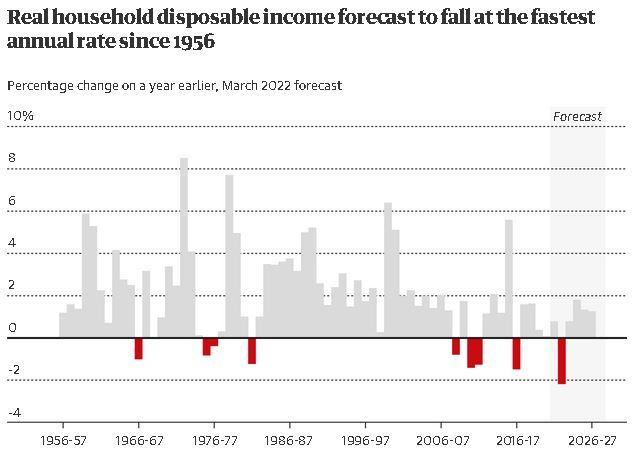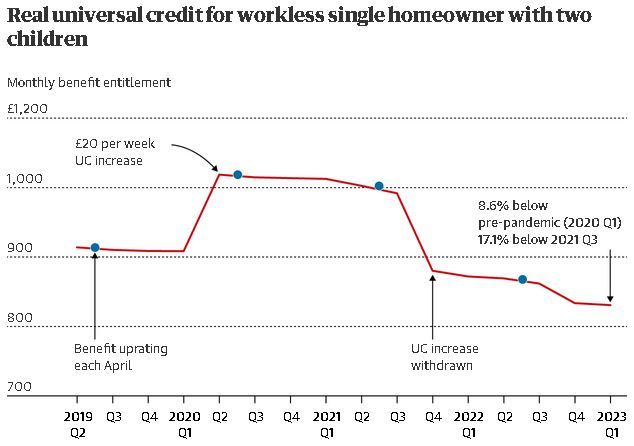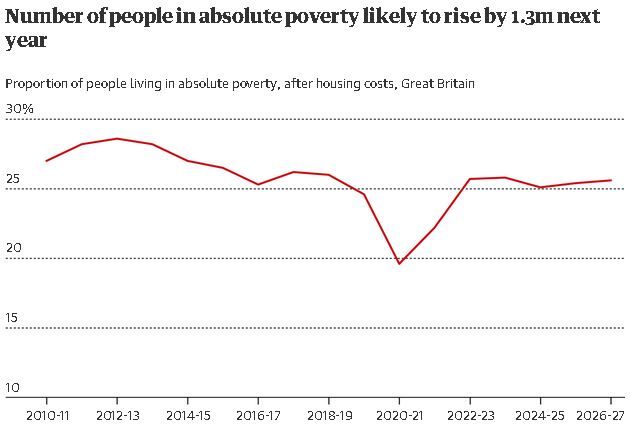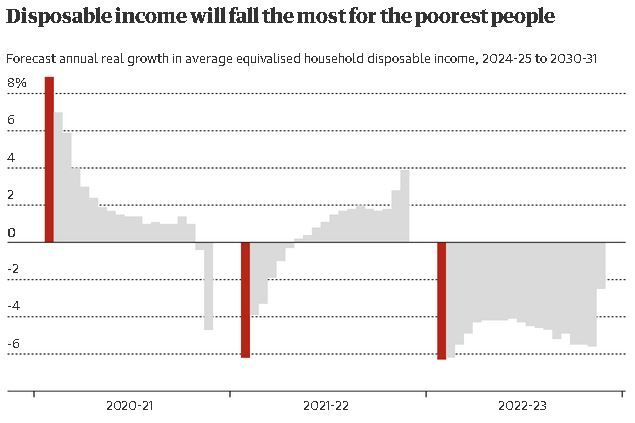
Rishi Sunak tackled over failure to help poorest families
Rishi Sunak has sought to defend his mini-budget against accusations he failed to shield Britain’s poorest families from the worst hit to living standards in six decades, as economists warned 1.3 million people will fall into absolute poverty next year.
Amid heavy criticism of Wednesday’s spring statement from opposition leaders and his own back benches, experts from the Institute for Fiscal Studies (IFS) and Resolution Foundation thinktanks said the chancellor could have done more to help those most at need.
With those on the lowest incomes bearing the brunt of Britain’s cost of living crisis, the Resolution Foundation said absolute poverty was now on course to hit almost a fifth of the population. It said half a million more children were expected to fall below the breadline this financial year, bringing the total number of people in absolute poverty to 12.5 million across the UK, up from 11.2 million.
The rise in absolute poverty – where households have less than 60% of the average income – would be the first time such an increase has been recorded in Britain outside of a recession, demonstrating the scale of the shock to family budgets as the war in Ukraine adds to a pandemic-induced surge in living costs.

In a round of spiky media interviews on Thursday, Sunak defended his plans by saying he could not solve “every problem” and insisted that measures such as a 5p cut to fuel duty, a rise in the national insurance threshold and the promise of an income tax cut in two years’ time would “make a difference”.
He said official forecasts for the biggest hit to living standards since the mid-1950s needed to be taken in context as Britain emerges from the “biggest economic shock in over 300 years” inflicted by the Covid pandemic.
After facing criticism for announcing no further support for those on universal credit, who will see their benefits rise by just 3% while inflation leaps to nearly 8%, Sunak retorted during a BBC interview: “We can’t do everything.”
However, leading economists said rhetoric deployed by the chancellor in his spring statement update to the house of Commons on Wednesday had failed to match up to reality.
Paul Johnson, the director of the IFS, said Sunak had “proved to be something of a fiscal illusionist” by announcing tax cuts and other measures that would only go a limited way to offsetting previously announced plans.
Raising national insurance by 1.25 percentage points from April while announcing cuts in income tax for the future “looks indefensible from an economic point of view, though one can see the political attractions”, Johnson said.
“He continues, despite his rhetoric, to be a chancellor presiding over a very big increase in the tax burden. What he did yesterday was not enough even to stop the expected tax burden rising yet further.”
Last autumn the government removed a £20 per week uplift in universal credit put in place during the pandemic, in a move charities warned would drive up poverty long before Russia’s invasion of Ukraine added to the highest rates of inflation for three decades.
Despite growing pressure on families, the IFS said the cut meant the value of universal credit for a single out-of-work homeowner with two children had fallen by almost a fifth in the space of six months, and was worth almost 9% less than before the pandemic after taking account of inflation.

On a day of heavy criticism from all quarters for the government over its handling of the cost of living crisis, Boris Johnson himself appeared to concede that the measures might not go far enough.
“As we go forward, we need to do more,” he told the LBC radio station before taking part in a Nato summit in Brussels. The prime minister suggested further steps would be taken to help families with the government’s imminent energy security plan, and dropped a heavy hint that more support could be provided ahead of a further expected increase in energy prices this autumn.
“Don’t forget that I think that the cost of living is the single biggest thing we’re having to fix, and we will fix it,” he said.
Johnson’s official spokesperson later insisted that “the prime minister fully supports everything the chancellor set out yesterday”.
With national insurance contributions due to rise by 1.25 percentage points next month and income tax thresholds frozen for four years, only one in eight workers will see actually see their tax fall by the end of the parliament, according to the Resolution Foundation.
Labour said Sunak was driving up the tax burden to the highest level in 70 years, while doing little to help the poorest in society. Pat McFadden, the shadow chief secretary to the Treasury, said: “He has chosen to press ahead with tax rises now to suit the Tory party election grid.
“That decision will have a direct effect in making the cost of living crisis worse for households in the coming year.”

Although tax cuts promised for the future could have placated backbench Tories uncomfortable with the chancellor’s plans, several dismissed his spring statement for doing too little to ease the burden on families.
While many Conservatives welcomed the plans, Lee Anderson, Tory MP for the “red wall” constituency of Ashfield, said cutting 5p fuel duty was a “drop in the ocean” given that it only lowered petrol prices to the level they stood at a week earlier.
“I would have liked it to have been much more,” he said.
Peter Bone, the veteran eurosceptic Conservative MP, said Office for Budget Responsibility figures showing the chancellor had about £32bn of headroom within self-imposed borrowing targets suggested he could have gone further.
“We said in the manifesto we weren’t going to raise taxes,” Bone told the Guardian. “He didn’t have to. And advertising the penny drop in income tax when we can’t possibly know what the situation is going to be in 2024 I was less than amused by.”
Peter Aldous, another backbencher, said he was disappointed that universal credit claimants would see their benefits rise by 3% – less than half what inflation is predicted to grow by. “With the economy in a state of near full employment, we must recognise the prevailing attitude that more work is always the answer cannot spare everyone the potential destitution some now face.”
With soaring living costs, the Resolution Foundation estimates a typical family will face a £1,100 loss of income this year, with poorer households bearing the brunt of the cost of living squeeze.

It said that over the five-year period from Boris Johnson’s election in 2019 – on a mandate to level up Britain’s economy after a decade of austerity – household incomes were now on track for the biggest fall of any parliament on record.
“The big picture is that Rishi Sunak has prioritised rebuilding his tax-cutting credentials over supporting the low- to middle-income households who will be hardest hit from the surging cost of living, while also leaving himself fiscal flexibility in the years ahead,” said Torsten Bell, the chief executive of the Resolution Foundation.
“Whether that will be sustainable in the face of huge income falls to come remains to be seen.”











